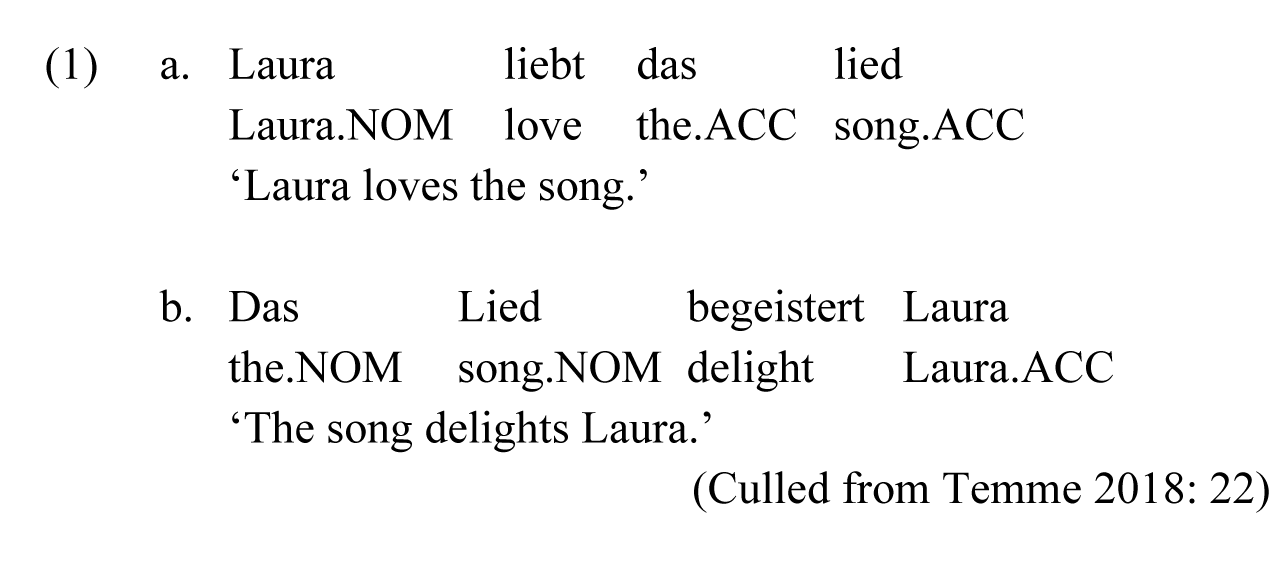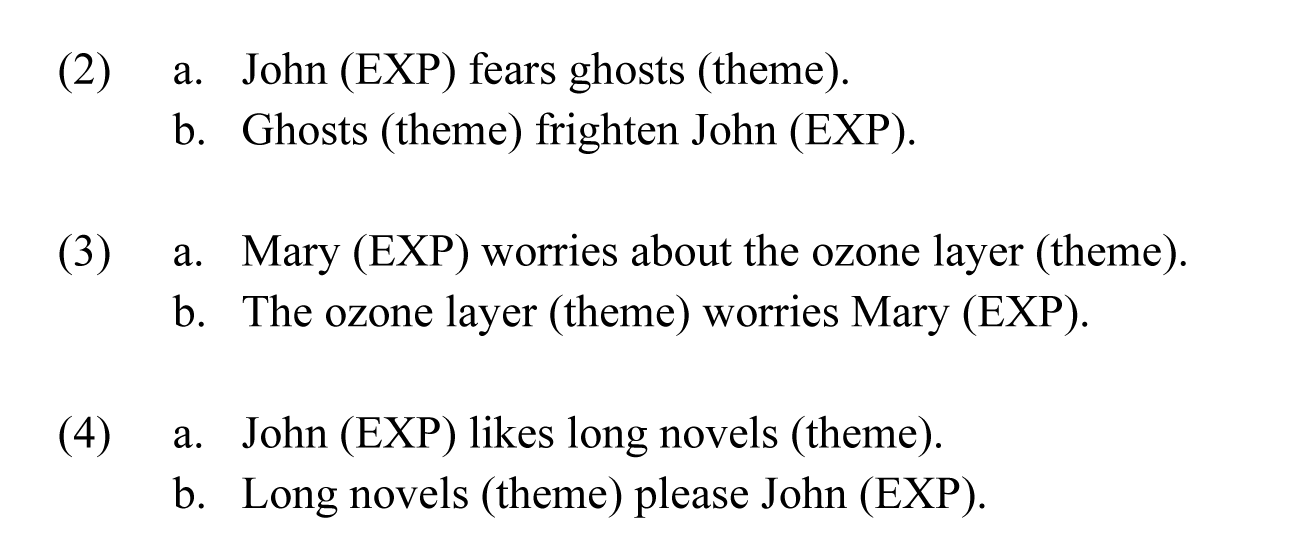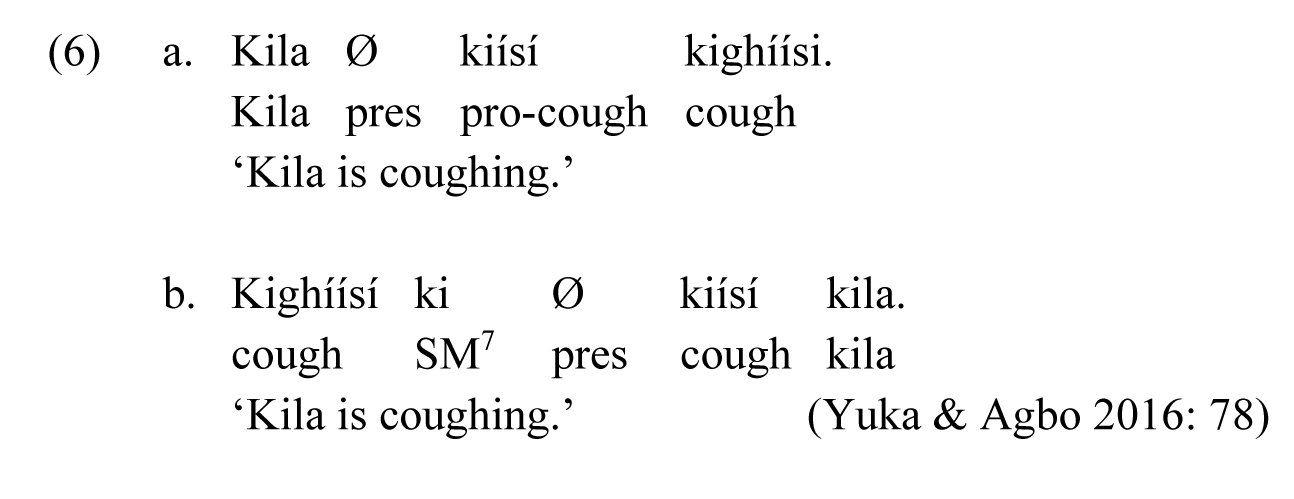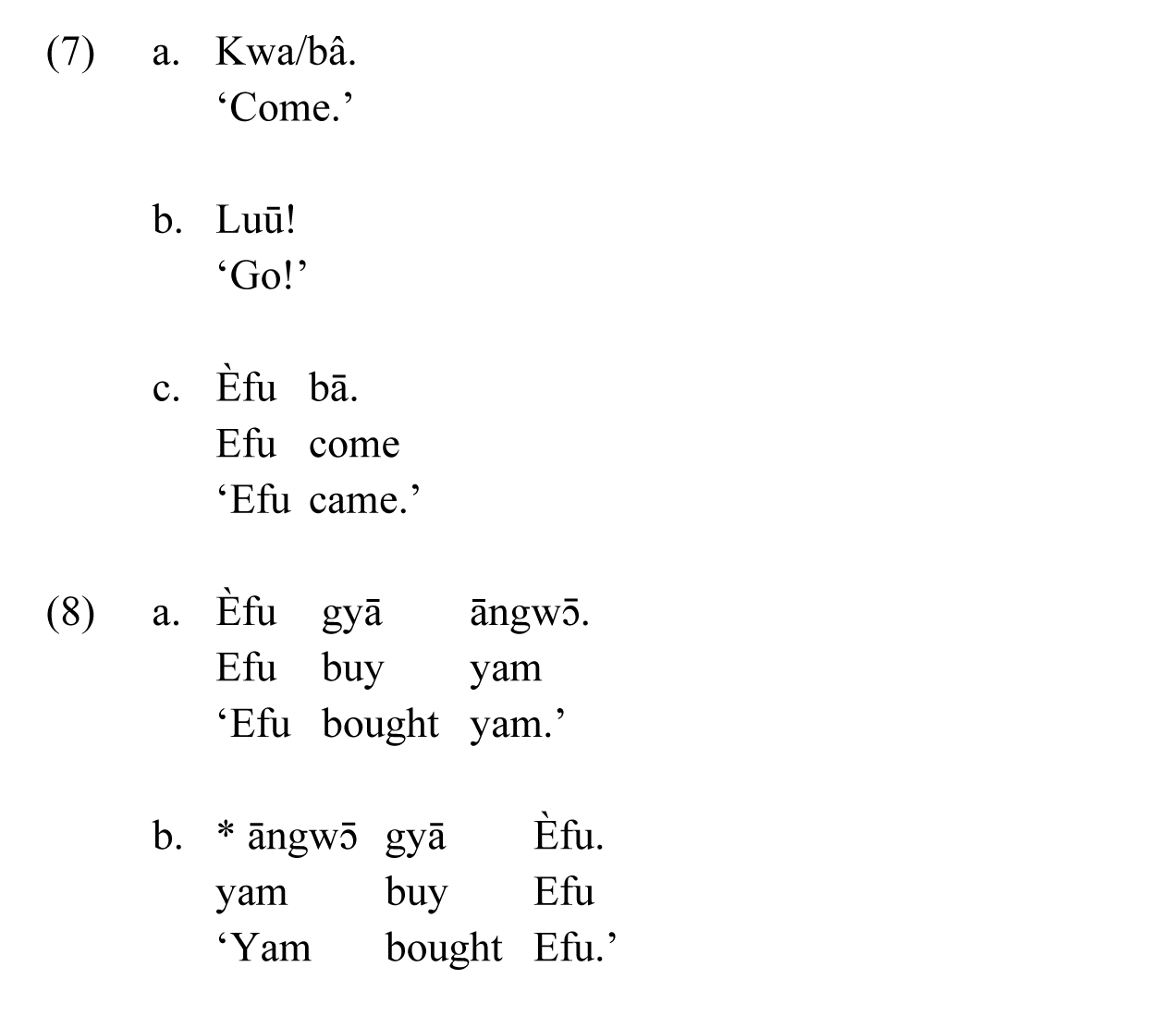1. Introduction
The special status of the arguments of experiential verbs, also referred to as psychological or psyche verbs, have been documented across languages. From a cross-linguistic perspective, certain peculiar features have been attributed to this verb class. For instance, the verb class involves two participants, and both participants can be realized as either the subject or the object of the verb.
Experiential situations have often been seen to mainly comprise states. However, predicates imply a change of state yet indicate states also belong to this class. Such predicates as ‘feel cold’, ‘be afraid’, ‘love’, ‘know’ are atelic and indicate states, and hence, they can be construed as telic events, as in ‘get cold’, ‘get scared’, ‘fall in love’, ‘learn,’ etc.
Verhoeven (2007) observes the fact that states lack a temporal dimension, resulting in them often being encoded as nouns or adjectives, rather than verbs, as is also partly the case in English.
Generally, experiential verbs have attracted scholarly interest basically due to the nature of their arguments. According to Landau (2010), a psyche verb is any verb that carries psychological entailments with regard to one of its arguments, usually the EXP.1 The recognition of this class of verbs as a special semantic class dates back to Postal (1971) who provided a syntactic account of this verb class. Semantically-oriented theories which have their emphasis on thematic relations have also been applied to the verb class due to the syntactic violations observed in the delineation of arguments based on the application of syntactic theories. Part of the issues posed by the psyche verb class concern the realization of subject and object EXP roles in sentential construct. For instance, following thematically based theories of grammar, a one-to-one correspondence exists between thematic roles and syntactic positions. However, the case with psyche verbs differs as the psyche verbs seem to realize the same roles in different syntactic positions.
In the study of the Etulo verb, it is observed that certain verbs allow alteration of arguments (subject and object) in a sentential construct. The observed alteration, however, does not bring about a change in the meaning of the expression. These verbs are examined in the present study in order to ascertain their distribution as well as to account for their possible features. The paper is organized as follows: Section 2 reviews literature related to the present study, while Section 3 discusses the methodology. In Section 4, argument realization in Etulo in addition to Etulo experiential verbs is explored. Section 5 forms the conclusion of the study. The next section goes into existing works in the direction of the present research.
2. Studies on Experiential Verbs
Languages are assumed to have varied classes of EXP verbs. The major distinction ascribed to this assumption is between EXP subject and EXP-object verbs (Belletti & Rizzi 1988, Landau 2010). In addition, particular linking behavior which deviates from that of prototypical transitive verbs has been ascribed to these subclasses. These peculiarities have been captured in terms of the difference in constituent structure (Postal 1971, Belletti & Rizzi 1988) and the difference in semantics.
Given these suppositions, studies have either to substantiate or refute the claim. For instance, Verhoeven (2010) examines whether the assumption about different semantics of verb classes may be empirically attested in the speaker’s intuitions about the felicity of verbs in particular contexts. Focusing on the non-agentivity and stativity of EXP Object verbs based on empirical study in German, Modern Greek, Chinese, Turkish, and Yucatec Maya languages, the study offers evidence that languages differ with regard to the lexical specification of EXP Object verbs for agentivity and stativity. Verhoeven’s (2010) study, which has implications for the typology of EXP Object verb classes, submits that speakers’ intuitions show that the heterogeneity of transitive EXP Object verbs apply to languages like German and Modern Greek but is not confirmed for Yucatec Maya, Turkish and Chinese. Based on the languages investigated, Verhoeven’s (2010) study submits that transitive EXP Object verbs split into two types, namely Type 1 represented by German and Modern Greek and Type 2 comprising Turkish, Yucatec Maya, and Chinese. Furthermore, the author avers that Type 1 (German & Modern Greek) distinguishes between a class of labile transitive EXP Object verbs compatible with agentive dynamic reading in addition to another class of transitive non-agentive EXP Object verbs that are stative. The Type 2 languages (Turkish, Yucatec Maya & Chinese) possess an analogous class of transitive EXP Object verbs similar to canonical transitive verbs, which can accommodate an agentive reading.
Temme (2018) observes that the most significant identification feature for psyche predicates is that one of their arguments termed EXP is in a mental or emotional state. The EXP argument in a two place argument structure usually has a corresponding counterpart referred to as the STIM.
Another property ascribed to psyche predicate is the ability to exhibit morpho-syntactic variability as shown in the instances below.
The examples show the existence of different case patterns for the stimuli and EXPs. Temme (2018) posits that psyche verbs denote emotional or mental states, while one of the arguments always represents the individual that carries the relevant feeling. A feature associated with the arguments of the verb is that the EXP and STIM can be encoded differently.
Laraghi (2020) introduces the term expertum, which refers to the content that is being experienced by the EXP. Thus, Laraghi suggests that the EXP is the main argument given a typical two-place argument of an experiential verb construct.
In the English language, the examples from Landau (2010: 3) shown below illustrate the case with psyche verbs.
From the examples above, one observes that the arguments of the verb fear in (2a) switch positions in (2b). This obvious switch does not however bring about a change in meaning. This is also the case in examples (3) and (4). One may, however, argue that the verbs are not exactly the same but the interest of this study, and the fact remains that the subject EXP changes from being at the sentence-initial position to the object position, which is illustrated by the examples in (2)–(4) being in sentence-final positions. This obvious change, however, fails to bring about a change in meaning.
This class of verb has also been recorded in Italian as illustrated in example (5).
The Italian data below further confirms argument switch as an attribute of the experiential verb class.
The Italian examples, just like their English counterpart, demonstrate a swap in argument positions with a slightly modified meaning resulting from the verbs teme ‘fears’ in (5a) and preoccupied ‘worries’ in (5b).
Engelberg (2014) in discussing the psyche verb class in German, notes that many psyche verbs allow alternation between stimuli and EXPs in the subject position. The author explores the quantitative distribution of psyche verbs with regard to their argument structure patterns, and more specifically the linguistic and nonlinguistic factors that determine the argument distribution of psyche verbs. Based on data from studies on German verbs in newspaper texts, German verbs in Corpora representing different text genres, and contrasting German and Romanian verbs in newspaper text, Engelberg (2014) asserts that different genres show particular preferences for specific kinds of argument structure patterns. On the basis of verb profile analysis, Engelberg posits that the cognitive entrenchment of each argument structure pattern seems to be facilitated by its strong association with very few verbs. Hence the authors assert that the general principle of the memory system influences the distribution of arguments.
The psyche verb class has also been observed in African languages (Igbo, Lamnso), and in tandem with already ascribed properties, the verbs have been noted to allow switch between arguments. The term subject-object switching is ascribed to Uwalaka (1988), who was the first to observe such verbs in Igbo, a Kwa language of the Niger-Congo language family. The subsequent investigation carried out by other scholars substantiates Uwalaka’s claim on the existence of this verb class as well as the peculiarity they demonstrate especially with regard to the alternation of arguments (Uchechukwu 2007, Agbo 2009, Iloene & Iloene 2013, Uchechukwu & Egenti 2015).
According to Uwalaka, only Igbo experiential and process verbs allow subject-object switching in a sentential construction. Furthermore, Uwalaka submits that verbs allowing subject-object switching have animate grammatical subjects. Experiential verbs according to Uwalaka are verbs that refer to the perception, cognition, sensation, and reaction of an entity. In addition, Uwalaka posits that experiential verbs centre on an entity’s inner experience. Agbo (2009), however, includes action verbs among the class of verbs that allow subject-object switching. In addition, Agbo refutes the earlier claim by Uwalaka on the animacy status of the grammatical subjects in subject-object switching and claims that verbs involved in this type of phenomenon also take inanimate grammatical subjects.
Uchechukwu (2007) views the phenomenon from the cognitive grammar perspective and suggests that the alternation involves two orientations, which are agent-orientation and patient-orientation. Uchechukwu & Egenti (2015) describes experiential verbs as those verbs used to code or give expression to one’s inner psychic processes or emotions. The authors advocate the cognitive grammar concept of construal as a tool for identifying and exploring the Igbo experiential verbs. Construal according to Uchechukwu & Egenti (2015) refers to the different ways of picturing or imagining a conceived situation. They devote attention to the patient-oriented construal of different categories of Igbo experiential verbs with the aim of using the cognitive approach to reveal the construal central to the Igbo language. Based on their findings, the authors emphasize the patient-oriented angle as a valid perspective for Igbo experiential verbs and further suggest that the patient-oriented viewpoint is central to the Igbo language.
Iloene & Iloene (2013) approach the issue of symmetrical predicates from a semantic perspective. From the point of view of the semantic roles, the authors argue that although the swapping of grammatical functions produces two grammatically well-formed sentences, the semantic roles in the two sentences remain the same. This suggests that whereas grammatical roles change at the syntactic level, semantic roles remain invariable.
Yuka & Agbo (2016) also observe this same phenomenon in Lamnso! Experiential verbs according to them, involves the swopping of syntactic positions between the subject and the object of a clause. They note that such verbs as kiísi ‘to cough’, yar jíŋ ‘to be affected by hunger’ and shwiy kiloŋ ‘to be angry’ permit the swopping of arguments. Their examples are shown in (6).
The Lamnso! examples from Yuka & Agbo (2016) affirm the submission by Iloene & Iloene (2013) on Igbo symmetrical predicates.
Elasri & Boubekri (2020) explores the universality and cultural specificity of emotions through a comparative analysis of emotion terms in English and MA. Based on semantic analysis, they discover that the organization of emotion terms in MA share similarity with English, a finding which is consistent with Johnson-Laird & Oatlay (1989)’s theory of emotions. The authors, however, note that causative emotions comprise the highest category in MA hence suggesting that emotions in the language are socially constructed.
Stonham (2019) discusses incorporation in Southern Wakashan languages, a family of languages spoken in the Pacifics, northwestern North America. Based on findings from textual materials and available recordings in the language, the author submits that what occurs in Southern Wakashan languages is not noun incorporation but a process of theme-attraction triggered by a feature of bound verbs.
From a morphosyntactic point of view, Caesar (2019) investigates allusive names in Dangme using both primary and secondary data. Following a categorization and coding analysis, Caesar claims that morphologically, Dangme allusive names are derived from morphemes and combine roots with other roots. With regard to syntax, the author submits that allusive names in dangme can take lexical, phrasal, and sentential forms and function as declarative, imperative, and interrogative clauses reduced to personal names.
In a study of negative markers in Idoma and Tiv languages, Sanusi & Oyewale (2019) attempt to discover the extent to which the strategies for marking negation in the two languages conform to the language universal assumption on negation. They adopt the principle and parameters approach in the analysis of the data and claim that negation in Tiv and Idoma contradicts the assumption under language universals because the negative markers occur at the sentence-final position rather than precede the main verb. The occurrence of a negative marker at the sentence-final position also occurs in the Etulo language.
Having reviewed studies on experiential verbs and other related studies across languages, one discovers that one major feature ascribed to psyche verbs pertains to the ability of their arguments to switch positions.
3. Methodology
Data for the study is based on elicitations from competent adult native speakers of the Etulo language. Based on the elicitations, a total of nine (9) verbs which demonstrate argument switch in Etulo are examined and analyzed descriptively. The language under investigation is a tone language having high, low, downstep, and gliding tones. In this study, we would follow Green & Igwe’s (1963) tone marking convention. Following this convention, the low tone is indicated with a grave accent [˴], the step tone is marked with a macron [ ̶ ], the gliding tone is marked with a modifier letter up arrowhead [˄], while the high tone is left unmarked. All tones except the high tones are marked in the Etulo data presented in Section 4 and Subsection 4.1. The present study adopts the Leipzig glossing rule in the gloss of the Etulo data.
The argument realization in Etulo is discussed in Section 4, while Subsection 4.1. explores the Etulo verbs that permit switches in subject and object arguments.
4. Argument Realization in Etulo Verbs
The basic structure of the Etulo clause is SVO. The Etulo verb consists of a verb stem in combination with other optional constituents. The verb in Etulo can be used alone. In addition, the verb can occur alongside its arguments. Consider the following examples in (7) & (8).
The Etulo example in (7a) instantiates the use of the Etulo verb in isolation. The use of the verb this way can be extended to the imperative (notice the exclamation mark) in (7b). In (7c), the verb is used alongside a subject noun phrase and thus (7c) exemplifies an Etulo intransitive construction having only one argument. Example (8a) shows the verb gyā ‘buy’ with two arguments Èfu ‘personal name’ as a subject and āngwɔ̄ ‘yam’ as an object. (8b) instantiates a switch in the position of subject and object argument. This, however, yields an ungrammatical structure not necessarily due to a violation of the Etulo word order, but rather based on a lack of meaning and subsequent non-demonstration of native-like competence in the language. Consider example (9) below.
As pointed out earlier, Etulo has SVO word order. However, the expression Èfu kpà anî which translates to I like Efu in (9) demonstrates a hierarchy of argument in which the subject position is occupied by the theme, while the EXP occupies the object position. The same hierarchy of argument seems to apply to the Igbo expression in (10).
However, this is different from what obtains in the English language, where the subject is the EXP, while the object corresponds to the theme. It should be noted that the Etulo verb kpa ‘like’ in example (9), despite being an experiential verb, does not demonstrate an argument switch in a way that other experiential verbs do (Section 4). We shall, however, not venture into this exception in the present study.
The next section of this paper shall go into the discussion of the verbs that allow argument alternation in Etulo, an Idomoid language of the Benue Congo language.
Despite the unacceptability of the structure in (8b) as a variant of (8a), there are some Etulo verbs that allow their arguments to modify positions in their occurrences as subjects and objects in sentential constructs. The alteration in argument positions, apart from being syntactically and grammatically acceptable, still yields the same meaning to the Etulo native speaker. The verbs found to exhibit this pattern are shown in example (11).
The examples in (11a) through (11i) are representative of the Etulo verbs that allow alternation of arguments without any corresponding change in meaning. The verbs that manifest argument alternation appears as predicates of involuntary activities. The subject argument of the verb kyɔ, Efu, which is the EXP in (11a), changes to the object argument position in (11a`). Though the change does not affect the meaning, there is an observed change in the tone of the verb kyɔ. Notice that the verbs in examples (11a) through (11i) are all verbs of bodily reaction, which are usually beyond the control of the EXP. For instance, the verb in (11a) & (11c) refers to the inner feeling of the EXP Efu ‘personal name,’ where the STIM ìtingā ‘anger’ and imiyo ‘fear’ appear abstract yet with the ability to trigger what is being experienced. As previously pointed out, verbs that exhibit this shared pattern also exist in other African languages. In Igbo for instance, Uwalaka (1988) posits the existence of this phenomenon and describes it as subject-object switching. However, Uchechukwu (2007) views the phenomenon from the cognitive grammar perspective and suggests that the alternation involves two orientations, which are agent-oriented and patient-oriented construals.
Within the role and reference grammar framework, this phenomenon is seen as an instance of a privileged syntactic argument. According to Van Valin (2005), a privileged syntactic argument is a conception of grammatical relation, which is construction-specific. That is, a privileged argument is identified for each construction such that if a single expression contains two different constructions with a distinct privileged syntactic argument, conflict need not arise. In examples (11a)–(11i), the privileged argument is anî ‘1SG’ while (11a`)–(11i`) have ìtingā ‘anger’, mnâ ‘sleep’, ìmiyō ‘fear’, àyibū ‘dizzy’, àyiwù ‘shame’, otse ‘sickness’, ɔ̀kwɔ̀ ‘cough’, èmbwà ‘hunger’ and ìfu ‘stomach’.
As evident from the Etulo language examples, the two arguments of the verbs are retained in sentential construct, and the construct is adjudged grammatical in Etulo.
5. Conclusion
In this study, we have examined the class of verbs relating to bodily and internal experiences in Etulo. These verbs are also referred to as psyche verbs. We have examined in a more general way the peculiar features ascribed to this verb class, especially with respect to their ability to switch arguments in sentential constructs. This particular feature, which has been confirmed for languages such as English, German, Igbo, and Lanmso! to mention but a few, has also been observed specifically for Etulo verbs relating to physiological and psychological experiences. Some of the Etulo verbs examined denote bodily experiences as in example (11i) in which the EXP is subjected to while some others have to do with psychological experiences as in examples (11a) and (11c). Verbs belonging to this subclass invoke certain feelings about someone or something. A feature of these verbs is that they have a SOURCE or STIM in addition to an EXPERIENCER. The SOURCE as seen in the examples appears abstract, while the EXPERIENCER is typically a being. With regard to the status of the EXP, the study observes that an obligatory animate EXP is required for meaningful construction. The meanings of the expressions whose arguments have been switched are still preserved and adjudged grammatical and as such reveal a demonstration of native-like competence in Etulo language. The findings of the study with regard to Etulo psyche verbs when compared to their Lanmso! Igbo, German, and English counterparts reveal similitude in both syntax and semantics. The present study, therefore, concludes, that Etulo verbs relating to physiological and psychological experiences validate the cross-linguistic assumption on the features of experiential verbs. We call for further investigation into other features of experiential verbs and other verb classes in Etulo.








